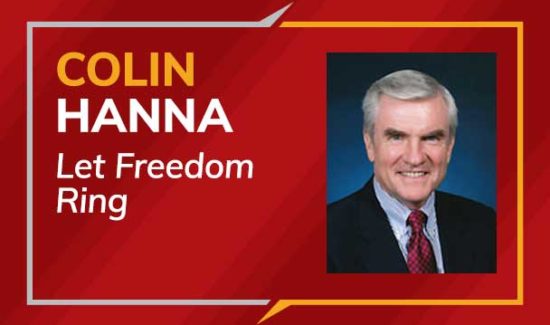Why Do Iran and Libya Dominate Our Debates?
Part 1 of 2 dealing with Middle East – once and for all
Pop Quiz 1: Which of the following is true:
A) It took Iran 25 years to build one subway line in its only major city, and 26 years to open a new airport.
B) Iran is once again garnering incredible attention in the presidential election. As a result, Iranian President Mahmoud Ahmadinejad’s ego has gone through the roof of the mosque.
C) Iran fell in line when the U.S. had a strong leader with a decisive policy on terrorism — on the day Ronald Reagan was inaugurated, the American hostages were released.
Answer: all of the above.
How is that possible? How can such a backwards country — despite its very educated and prodigious people — continually dominate headlines and so significantly affect American foreign policy?
Easy. Bi-partisan ineptitude and cowardice in dealing with the Middle East, especially Iran’s pursuit of nuclear weapons.
Oh sure, we’re told by the "experts" that the Iranian situation is far too complex for the average American — a global chess game played by diplomatic masters.
Translation: Neither Party knows what the hell they’re doing.
*****
Pop Quiz Two, again looking for true statements:
A) For years, Libya was a rogue nation that openly engaged in terrorism, harbored the training camp for the Achille Lauro cruise ship high-jackers, bombed the Rome and Vienna airports as well as the Berlin nightclub that killed a U.S. serviceman, and incinerated Pan Am Flight 103.
B) Libya fell in line when the U.S. had a strong leader with a decisive policy on terrorism (Ronald Reagan, George W. Bush).
C) Despite this, the U.S. chose to oust Muammar Gaddafi and help install a new regime comprised of Libyans who had traveled to Iraq to fight Americans.
D) That regime showed its appreciation by, at best, sitting idly by while the U.S. embassy in Benghazi was attacked and the American ambassador murdered.
Again, all of the above.
Sure, there are questions about why extra security requests at the embassy were denied, as well as why it took the Administration so long to acknowledge that an anti-Mohammed movie was not the reason behind the attack.
But the larger questions were totally missed: 1) why did we invade a friendly Libya in the first place; 2) why are Iran’s nuclear ambitions proceeding unimpeded; and 3) why is America’s overall policy in the region failing? Until these issues are addressed, the fuse on the Middle East powder keg will inch closer to detonation.
*****
To solve the problem, we need to ensure that past mistakes of both Parties are not repeated. And their biggest one has been kicking the Middle East can down the road to future Administrations.
The first President Bush built a respectable worldwide coalition when he waged the Gulf War in 1991, but contrary to his generals’ advice, he stopped short of finishing off Saddam Hussein and his Republican Guard. Bush also reneged on his promise to assist the Kurds in their attempt to overthrow Hussein. Because of this, they were slaughtered, and Hussein remained in power. Bush left the Iraq problem to future Presidents, including, ironically, his son.
Likewise, President Clinton had Osama bin Laden literally in his sights, and could have eliminated the September 11 mastermind, but failed to act. Instead, Bin Laden plotted away, and the rest is history. Clinton, like the first Bush, left the problem to the next President.
George W. Bush originally acted as if understood the concept of decisive action. He invaded Afghanistan, took down the Taliban, and eliminated terrorist training bases. The bad guys were on the run, and the noose should have been tightened until they were crushed. Instead, the "need" to invade Iraq shifted American priorities, allowing many terrorists to escape and fight another day. Not coincidentally, there has been a huge resurgence of terrorist activity throughout Afghanistan, to the point where Americans cannot trust the very Afghanis they have trained.
And now we have an Obama Administration that betrayed Gaddafi, a reliable ally who did everything the U.S. asked of him. While no angel, and clearly acting out of self-preservation, Gaddafi nonetheless "played ball," helping to root out terrorists and stopping his WMD programs. Despite Gaddafi being taken off the State-Sponsored Terrorism List and being praised by George W. Bush and Condoleezza Rice, Libya was invaded with the sole purpose of regime change. The resulting message was that America could no longer be trusted.
*****
Each of those Administrations has something else in common: none worked to achieve energy independence. If they had, Libya and Iran wouldn’t matter all that much. Bush I signed the offshore drilling moratorium, and neither Clinton, Bush, Jr. nor Obama made any genuine effort to lift it.
In addition to energy independence resurrecting America’s manufacturing base and fostering unprecedented growth, it would also give America and the world economic breathing room if and when military action becomes necessary to take out Iran’s nuclear capabilities. Sure, oil and gasoline prices would spike after an attack. But energy independence would make the blow exponentially less, since utilizing our vast domestic resources would alleviate America’s paralyzing dependency on Middle Eastern oil. In effect, energy independence, or at least tangible action toward achieving that goal, would de-sensitize world financial markets to a strike on Iran.
Is Iran months, or even minutes, away, as some would have us believe, from getting the bomb? Well, if their quarter-century long infrastructure progress is any indication, then the answer would seem to be "No." But since Ahmadinejad obviously cares more about nukes than airport, it’s a good bet that the unthinkable is looming, requiring action sooner than later.
The only problem is that we continue to be bent over the Iranian oil barrel.
If we do nothing, Iran becomes a nuclear-weaponed state — one which will most likely provide those weapons to terrorists who wish to make New York uninhabitable for one hundred years. But since the United States is anything but energy independent, a strike will see oil spike over $200/barrel overnight, leading to gas prices of $10/gallon.
So what do we do?
For starters, deal with rogue nations in the only language they understand: steel resolve, an iron fist and the mettle to act, not just talk.
Part Two will offer an analysis into dealing with rogue nations, including Iran.
Chris Freind is an independent columnist, television/radio commentator, and investigative reporter who operates his own news bureau, www.FreindlyFireZone.com His self-syndicated model has earned him the largest cumulative media voice in Pennsylvania. He can be reached at [email protected]





